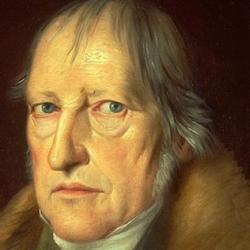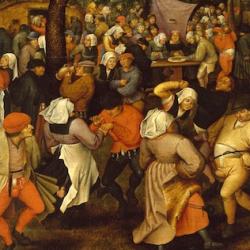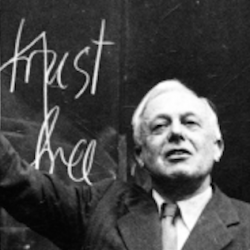Almost no one knows the name of Eugen Rosenstock-Huessy. That is unfortunate, but may be changing as Rosenstock’s intimate friend Franz Rosenzweig enjoys a boomlet of attention and with the publication of Wayne Cristaudo’s Religion, Redemption, and Revolution.
Among that tiny subculture that has actually heard of Rosenstock, it has somehow become axiomatic that he was a “neo-Hegelian philosopher.” This is misleading in at least two senses: First, because Rosenstock would have disclaimed the label “philosopher” and second because his assessment of Hegel is too complex for the neo-Hegelian label to stick.
What follows is hardly a full account of Rosenstock-and-Hegel; rather, a few notes to indicate the sorts of fundamental objections Rosenstock brought against Hegel.
In The Christian Future, Rosenstock writes that while the “language of the secular mind is either universal and abstract . . . or concrete and particular” the “language of the Christian soul is at the same time universal, unifying, and yet personal, bestowing concrete singleness of purpose on speaker and listener” (129). He admits in a footnote that this claim is “somewhat reminiscent of Hegel,” but explains the echo by observing that he and Hegel have a common source: “Hegel . . . developed his philosophy out of a study of Christian history.” But Rosenstock adds, “As an idealist, however, Hegel completely reversed the Christian meaning of concreteness; God is not found inside our minds or ideas; He speaks to us through the other fellow we try to help. The creative energies of Faith, Hope, and Love are not properties of minds but bonds between men” (fn 3, 129).
Later in the same book, Rosenstock criticizes the way conflicts between Faith and Reason have been mapped out for the “past eight hundred years”: “The two sides have generally ignored or fought each other; at best they have divided up reality between them in a pedantic compromise. From Thales to Hegel all philosophy began its thinking with the world of space or the knowing mind and a corresponding logic of timeless abstractions, and time appeared consequently in foreshortened perspective, being considered primarily from a spatial point of view. . . . Theology, on the other hand, never started with space nor did it admit the equal dignity of space problems. It was interested in time, in history; it dealt with the creation of Adam, the birth of Jesus, the death of the Lord, the founding of the Church, the Last Judgment – all topics that a philosopher need never even mention” (173). This division of labor was part of a working compromise between Christianity and Greek thought, but Rosenstock thinks that “today the compromise has ceased to work. . . . the old clear lines refuse to be drawn, yet the Western mind is paralyzed by the inherited split between two modes of thought that should be supplementary” (174).
That comment about Hegel may be taken to imply that Hegel had escaped from the spatialized, abstract world of philosophy, but this isn’t Rosenstock’s conclusion. Insofar as he is an idealist, Hegel’s thought remains within the same constraints. In a summary of a letter from Rosenzweig to Rosenstock, Cristaudo refers to “Hegel’s fundamental departure from Christian Heilsgeschichte. Rosenstock-Huessy was not at all impressed with Hegel’s extremely narrow selection of the ‘reasons’ around which the Spirit turns and upon which history is made. And given how much Rosenstock-Huessy wrote about Church history and how attentive he was to demonstrating how Christian institutions and practices are embedded both in Europe and in the world, he was even less impressed by Hegel’s almost complete lack of interest in the Church” (308).
Rosensock does rehabilitate some Hegelian concepts that, in his judgment, Hegel mishandled, precisely because of his lack of attention to the concrete realities of redemptive history. Cristaudo notes that in one work, “Rosenstock-Huessy made an explicit and favourable reference to Hegel’s teaching of ‘objective spirit,’ which, though, he inflected through ‘a spontaneously exercised use of speech’ . . . of a particular self-contained self-developing power/force in the course of history. But then he added that this idea of ‘objective spirit’ that absorbs the free will into a higher necessary complex developing through its own laws and necessity is ‘actually the theme of the union of Christendom and peoples in the West.’ In short, Rosenst0ck-Huessy did not want to dispense with a concept that Hegel had mishandled . . . in an Idealist and restorationist manner and that had been central to the self-making of Christendom” (307).
Like Rosenzweig, Rosenstock was sharply critical of the political consequences of Hegelian thought. Cristaudo again, “In Hegel’s thought, it was not merely the state that becomes divinized – which for Rosenstock-Huessy would be concern enough – but a particular form of it (viz., Prussia). This, for Rosenstock-Huessy, is as crazy as it is sad. Nevertheless, it is highly instructive; for every other attempt to divinize (a form of) the state is bound to meet with failure. And it is precisely this desire to transpose a particular, provisional, temporal, historical form onto the end of things that had proved such a disaster for European statists . . . and nationalists. Given that Rosenstock-Huessy’s own deployment of the concept of totality was also accompanied by a reading of history as a history of salvation . . . and hence as providential, in which the nations play their part, it is important to underscore this fundamental difference with Hegel” (307).
As I say, this is hardly complete. But perhaps it’s enough to question any easy equation of Rosenstock with Hegel, which may produce an equally easy dismissal of a great, neglected thinker.















